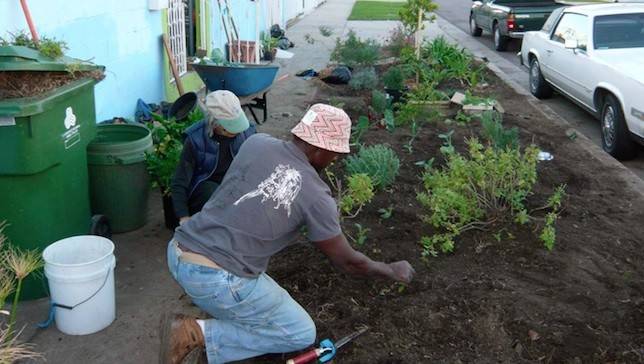Source: mnn.com
Published: March 17, 2015

The start of Ron Finley’s famed parkway ‘food forest’ in South Los Angeles, 2011. (Photo: LAGreenGrounds/flickr)
Once an act of guerrilla gardening, residents can now grow curbside veggie plots without permits.
There’s always been something sexy, cool, dangerous — a bit “gangsta” as Los Angeles-based fashion designer and local food advocate Ron Finley would put it — about gardening in areas where, technically, you’re not supposed to. And, no doubt, there’s a distinct thrill at doing something — in this case, under-the-radar urban homesteading on public property — that city authorities have classified as verboten, especially when the end result is something so beautiful, so bountiful, so beneficial. Essentially, guerrilla gardening is the neighborhood-bettering, life-improving marriage of rebellion and altruism.
But, of course, that do-gooding rush can be squashed when the city starts slapping you with fines. Because really, there’s nothing really that sexy about a stack of citations brought on by a modest curbside tomato garden.
Thanks to a new ordinance approved earlier this month by the Los Angeles City Council, however, guerrilla gardeners will soon be able to go about their greenthumbed business in a slightly less guerrilla fashion.
In the past, Los Angeles residents needed to obtain a $400 permit to grow fruits, vegetables or herbs on city-owned parkways — those barren, weed-ridden strips of water-hungry turf grass and shrubbery located between the street and the sidewalk. As many Los Angeles residents have discovered the hard way, growing curbside veggies sans a permit yielded bureaucratic headaches along with fresh, hyperlocal produce.
Being able to transform a vacant patch of city-owned landed into a thriving vegetable garden without needing a pricey permit (fruit trees, however, will still require one) as allowed by the new ordinance is a hugely important step forward for Los Angeles, particularly in South Central neighborhoods where easy access to fresh, nutritious and affordable food is nil.
But as KPCC points out, despite no longer requiring permits, parkways-turned-edible gardens must fall under city-authored parkway landscaping guidelines — and these revised guidelines haven’t quite been ironed out. Guideline specifics, which need to be tweaked by city staff and then approved by the city council, would include how tall edible plants can grow and how far they must be from the actual curb.
At Wednesday’s meeting, Councilman Bernard Parks asked staff to pay special attention to how planting fruit and vegetables in parkways might affect sidewalk access for drivers, pedestrians and people with disabilities. Stalks of corn or passion fruit vines planted too close to the curb, for example, might make it impossible for people to get out of their cars.
The tireless advocacy of Finley, a sort of urban ag folk hero and self-described horticultural revolutionist, is largely to thank for the creation and passage of the ordinance. “I’m elated,” Finley told Los Angeles Magazine of the news. “The benefit for the city is healthier citizens, fresher air, new ecosystems. I see birds outside my house that I’ve never seen before. That means a lot.”
In 2011, Finley’s own parkway garden outside of his South Los Angeles home came under fire from city officials. The whole ordeal, which even involved an arrest warrant for illegally planting carrots, was no doubt a headache for Finley. But community leaders, food activists, fellow gardeners and some local politicians including Councilman Herb Wasson rallied behind him all the way to city hall. Finley, in the end, was allowed to keep his lush “food forest.” But he used his tangle with city brass as a springboard to call for, excuse the pun, deep-rooted change in how the city approaches edible gardening on vacant, city-owned land, particularly in lower-income areas considered food deserts.
“I got tired of trying to find health food in the neighborhood,” Finley told LA Weekly last summer when asked why he started his own curbside garden. “If someone wants prescription drugs or liquor, they’re plentiful, but to get an organic apple? That was a needle in a haystack.”
Click here to watch “A guerilla gardener in South Central LA | Ron Finley”: https://www.youtube.com/watch?v=EzZzZ_qpZ4w
Finley’s 2013 TED talk (embedded above) is one of the great ones: funny, impassioned, sobering, incredibly charismatic — the guy’s a natural. If you’ve never seen Finley give a speech (he gets around — I saw him at Greenbuild 2013 in Philadelphia where he whipped a bunch of polite, button-up building professionals into a frenzy) take a few minutes to watch it.
Via [KPCC], [Los Angeles Magazine]
